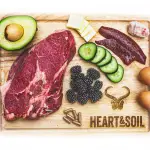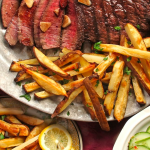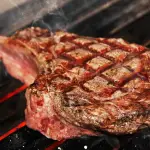Irritable bowel syndrome and carnivore diet: Can a carnivore diet help with your IBS?
Many people around the globe live with irritable bowel syndrome (IBS) and suffer from symptoms like stomach discomfort, unexpected diarrhea, and episodes of constipation.
IBS is related closely to microbiota, which are living bacteria in the gut. The carnivore diet can help with IBS because it creates more “good bacteria” in the gut, and consists of vitamin-rich foods.
Here we show you how to heal your gut and IBS with the carnivore diet.
TABLE OF CONTENTS
What is Irritable Bowel Syndrome (IBS)?
IBS is the most common digestive tract disorder in the United States. It is irritation of the digestive tract lining caused by agents identified as foreign by the body.
The symptoms of IBS include bloating, cramping, abdominal pain, flatulence, diarrhea or constipation, or both in alternation. To date, no laboratory test can correctly diagnose this disorder. Diagnosis is made entirely on the signs and symptoms.
What Causes IBS?

IBS is a disorder affected by diet. Research has shown that diets rich in FODMAPs (fermentable oligo-, di-, and monosaccharides and polyols) are one of the causes and aggravating factors of IBS.
FODMAPs are non-digestible carbohydrates broken down by gut bacteria, causing irritation of the gut and flatulence. FODMAPs are rich in lactose-containing dairy products like milk and yogurt, fruits like apple and cherry, plus wheat, rye, and some vegetables.
Low FODMAP diets are recommended to improve quality of life for people with IBS. Foods that should be avoided include insoluble fibers, gluten, dairy products containing lactose, fried foods, beans and legumes, and processed foods including chips, processed meats, and deep-fried foods.
Alcohol, caffeinated drinks, sweeteners, chocolates, garlic, broccoli, and cauliflower should also be avoided to keep the gut from being irritated.
How the Carnivore Diet Helps with IBS
The carnivore diet can help with IBS because it’s a diet low in FODMAPs, so it does not cause irritation to the gut. Carnivore food items such as beef, lamb, chicken, fish, and eggs all have little to zero dietary fiber.
The diet eliminates all plants, and all FODMAPs if you exclude dairy too (although usually you can have yogurt on the carnivore diet). The foods you eat and even the carnivore diet drinks you consume won’t irritate your gut.
The carnivore diet shifts your microbiome by changing the bacteria in the gut. If you eat meat, bacteria living on amino acids increase in the gut. The microbiome shift is seen under a week and your IBS symptoms could disappear within days.
To take full advantage of the healing effect of the carnivore diet, you should go full carnivore as an extreme elimination diet to see if your symptoms improve. You can add one food group back at a time to see if your IBS symptoms return.
Vitamins and Minerals
The carnivore diet is also rich in minerals and vitamins that play a huge role in combating IBS symptoms. This diet provides Vitamin D, Zinc, Magnesium, anti-oxidants and anti-inflammatory benefits.
Vitamin D
Researchers from the University of Sheffield in England found out that the majority of the patients with IBS have a deficiency in their vitamin D levels irrespective of their geography or latitude.
They postulated that vitamin D deficiency might aggravate the ongoing disease process, and an adequate supply of vitamin D can dramatically improve the quality of life.
Some carnivore sources of vitamin D are cod liver oil, salmon, swordfish, tuna fish, lactose-free dairy products, sardines, and beef liver and kidneys.
Magnesium
Magnesium is one of the essential nutrients and is highly recommended to treat IBS. It is thought to ease abdominal pain and cramping, and is recommended to reduce the stress and anxiety of the disease.
It softens stools and relieves IBS-associated constipation. Though plant foods are a rich source of magnesium, it can also be obtained from some fish, including salmon.
Zinc
Individuals with IBS should be screened for zinc as its deficiency can lead to neurological manifestations. Oysters, eggs, and beef are some good sources of Zinc.
Conclusion: The Carnivore Diet Healed My Gut
I experienced first-hand the healing effects of the carnivore diet on the gut, so I can’t recommend it enough. There are plenty of carnivore diet documentaries that show real-life stories of the benefits of a low carb diet. To heal your IBS and reset your gut to essentially how your ancestors lived, make sure you are strict with the diet, and then gradually reintroduce foods.
This diet has also been shown to help with other medical conditions. Learn more about:
- Carnivore diet and arthritis
- Carnivore diet and erectile dysfunction
- Carnivore diet and hair loss
- Carnivore diet and inflammation
- Carnivore diet and insomnia
- Carnivore diet and kidney stones
- Carnivore diet and menopause
- Carnivore diet and multiple sclerosis
- Carnivore diet for psoriasis
- Carnivore diet and rosacea
- Carnivore diet for SIBO









Been doing diet for one month Direa IBS for years since early 2000. Highest test for Lupus in BC Interior. Been Gluten free (strictly) since 1995 (Lupus saw many Specialists, Dr Mc Leod said he could see serious problems ahead for me) Hospitalisation
I am energetic, always have been. First Month still direa now every second day! Hanging in there! Hope for best :0) Husband joined me (age 74 )